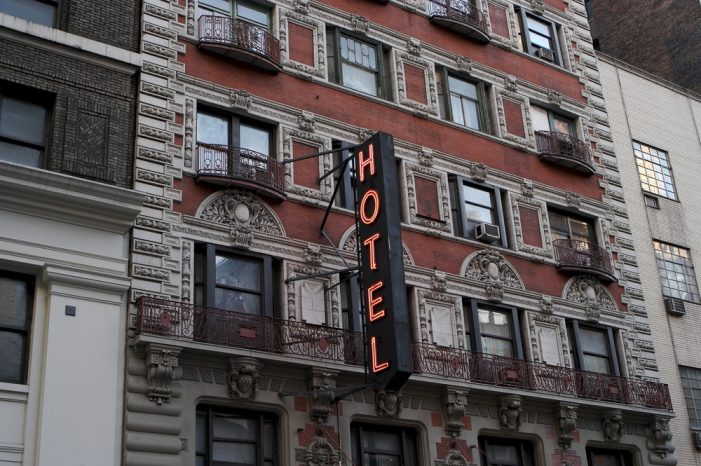By Chris Tobias, WWT Exclusive | Editorial Credit: Leonard Zhukovsky/shutterstock.com
In recent years, New York City has taken significant steps to ensure its residents’ and visitors’ safety and well-being. One of the latest legislations to address this concern is the Safe Hotel Act NYC. This groundbreaking law, enacted to enhance security and protect vulnerable populations, is a crucial development for the hospitality industry and travelers alike. In this article, we’ll delve into the details of the Safe Hotel Act NYC, its objectives, and its implications for hotels and guests in New York City.
What is the Safe Hotel Act NYC?
The Safe Hotel Act NYC is legislation designed to enhance hotel safety standards across New York City. To address growing concerns about security and safety, the Act mandates that hotels implement measures to protect their guests. These include regulations around emergency preparedness, staff training, and the overall security infrastructure of the establishment.
Key Provisions of the Safe Hotel Act NYC
- Enhanced Security Measures
One of the primary goals of the Safe Hotel Act NYC is to strengthen security protocols within hotels. Under the new law, hotels are required to:
- Install Surveillance Cameras: Hotels must place security cameras in common areas such as lobbies, hallways, and entrances. This measure aims to deter criminal activity and provide evidence in case of incidents.
- Improve Lighting: Adequate lighting must be maintained in and around the hotel premises to enhance visibility and deter potential threats.
- Secure Entry Points: Hotels must ensure that all entry points, including doors and windows, are secure and meet specific safety standards.
2. Staff Training and Emergency Preparedness
The Safe Hotel Act NYC places significant emphasis on staff training and emergency preparedness:
- Mandatory Training Programs: Hotel staff must undergo regular training sessions on emergency response, conflict resolution, and safety protocols. This training helps staff handle emergencies effectively and provides a safer environment for guests.
- Emergency Plans: Hotels must develop and maintain comprehensive emergency response plans. These plans should include procedures for evacuations, handling medical emergencies, and addressing other critical situations.
3. Guest Safety and Communication
Ensuring guest safety is a top priority under the Safe Hotel Act NYC:
- Clear Communication: Hotels must clearly inform guests about safety procedures, emergency exits, and contact numbers for local emergency services.
- Guest Feedback Mechanism: Establishments must implement systems that allow guests to confidentially report safety concerns or incidents.
Implications for Hotels
Compliance Requirements
Hotels operating in New York City must comply with the Safe Hotel Act NYC to avoid penalties and legal repercussions. Compliance involves:
- Upgrading Security Systems: Hotels may need to invest in new technology or upgrade existing security systems to meet the Act’s requirements.
- Conducting Regular Training: Establishments must allocate resources for ongoing staff training and development.
- Maintaining Documentation: Hotels must keep detailed records of their safety measures, training programs, and emergency plans.
Financial Impact
While compliance with the Safe Hotel Act NYC may involve upfront costs, the long-term benefits outweigh the expenses. Enhanced security can lead to increased guest confidence and potentially higher occupancy rates. Additionally, compliance can help avoid costly fines and legal issues.
Benefits for Guests
Increased Safety
The Safe Hotel Act NYC provides guests with greater assurance regarding their safety while staying in New York City. Implementing enhanced security measures and staff training ensures a safer environment for all visitors.
Improved Transparency
Guests benefit from clear communication about safety procedures and emergency plans. This transparency helps travelers make informed decisions and feel more secure during their stay.
Support for the Safe Hotels Act
The Safe Hotel Act NYC represents a significant advancement in protecting guests and enhancing safety within the hospitality industry. The Act aims to create a safer environment for travelers in New York City by mandating rigorous security measures, staff training, and clear communication. Hotels must navigate the compliance requirements, but the long-term benefits for guests and the industry are substantial. As New York City continues to evolve, legislation like the Safe Hotel Act NYC ensures a secure and welcoming experience for all who visit.
NYC CLC President Alvarez has called on the passage of the legislature. In a recent OpEd, he wrote, “It’s easy to take for granted the rights enjoyed by workers today, like equal pay for equal work, the 8-hour workday, paid sick leave, OSHA safety standards, and child labor laws. They seem so obvious in retrospect. Who could have been against these things?”
He added, “Someday in the future, we’re sure people will feel the same way about the Safe Hotels Act. Who could have stood against panic buttons and basic workplace protections? Or against the basic concept of requiring a license in order to operate a hotel in our city? Many of these basic protections are already provided by the unionized hotel industry, and there’s no good reason they shouldn’t apply to all hotel workers.”
He emphasized, “It’s time for workers and labor allies to get organized, get down to City Hall, and get the Safe Hotels Act passed. In the next few weeks, we’ll have a clear picture of who stood with NYC’s workers and who stood against them. And by next Labor Day, we can all celebrate a safer hotel industry—one that’s not only safer for workers but for guests and the broader community, too.”

